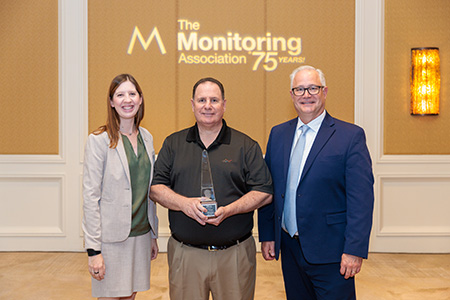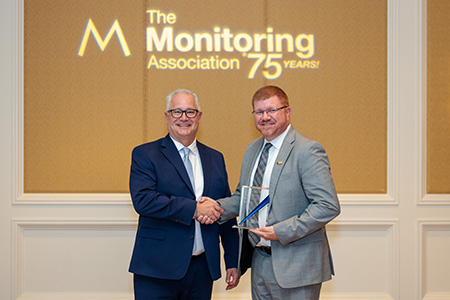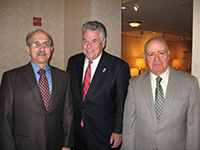Hertel, Martini, and Prendergast honored with top TMA Awards at 75th Anniversary Annual Meeting
TMA President Steve Butkovich honored the outstanding contributions of three individuals last week in at the 2025 TMA 75th Anniversary Annual Meeting in Palm Springs, CA.
 On Mon., Oct. 6th, at the General Membership Meeting, Butkovich presented the 2025 Stanley C. Lott Memorial Award to AICC legal counsel John Prendergast, managing partner, Blooston, Mordkofsky, Dickens & Prendergast, LLP, in recognition of his unwavering advocacy efforts on behalf of AICC and TMA members. The Stanley C. Lott Memorial Award, established in 1991 to honor its namesake, a dedicated leader and past president, recognizes exceptional long-term TMA leadership and support.
On Mon., Oct. 6th, at the General Membership Meeting, Butkovich presented the 2025 Stanley C. Lott Memorial Award to AICC legal counsel John Prendergast, managing partner, Blooston, Mordkofsky, Dickens & Prendergast, LLP, in recognition of his unwavering advocacy efforts on behalf of AICC and TMA members. The Stanley C. Lott Memorial Award, established in 1991 to honor its namesake, a dedicated leader and past president, recognizes exceptional long-term TMA leadership and support.
Prendergast expressed his gratitude for the recognition, stating, “I am deeply honored to win the Stan Lott award, especially given the outstanding people that have won it before me; and I have been privileged to have worked with all of the dedicated and professional TMA members and staff, past and present, that have made representing the alarm industry so rewarding.”
 Also presented at the General Business Meeting, former APCO President Stephen Martini, ENP. CPE, director, Metro Nashville Dept. of Emergency Communications, received the 2025 Public Sector Award. This special honor, established in 2015, is presented by TMA to a public safety professional whose contributions have supported the monitoring industry’s mission to protect and save life and property. Martini has been a longtime champion for TMA’s ASAP Service.
Also presented at the General Business Meeting, former APCO President Stephen Martini, ENP. CPE, director, Metro Nashville Dept. of Emergency Communications, received the 2025 Public Sector Award. This special honor, established in 2015, is presented by TMA to a public safety professional whose contributions have supported the monitoring industry’s mission to protect and save life and property. Martini has been a longtime champion for TMA’s ASAP Service.
“I am honored and humbled to receive this recognition. The work TMA is doing with the ASAP Program is saving time, saving lives, and reducing workloads on emergency communications professionals,” said Martini. “This commitment to the public we serve and the professionals we depend on to carry out this no-fail mission is critical to the success of public safety response for the next decade.”
 On Wed., Oct. 8th, at the closing Gala Dinner, Butkovich presented the 2025 Mel Mahler Award to Morgan Hertel, Rapid Response Monitoring Services Inc. The Mel Mahler Award is presented at the discretion of the TMA president in recognition of outstanding contributions within his/her tenure. Hertel has served as a volunteer leader for decades, contributing his knowledge, experience, and expertise to the TMA community.
On Wed., Oct. 8th, at the closing Gala Dinner, Butkovich presented the 2025 Mel Mahler Award to Morgan Hertel, Rapid Response Monitoring Services Inc. The Mel Mahler Award is presented at the discretion of the TMA president in recognition of outstanding contributions within his/her tenure. Hertel has served as a volunteer leader for decades, contributing his knowledge, experience, and expertise to the TMA community.
“Thank you. I am truly honored to receive this recognition. I have always believed that active participation in our industry associations is not just beneficial, but essential for our collective success,” shared Hertel. “The Monitoring Association is, without a doubt, the most important organization in our industry. This achievement is not mine alone. It is built upon the foundation laid by those who came before me, and it is shared with the dedicated leaders who will follow. It is through this collaborative spirit that we are able to achieve such meaningful results.”



 “How do you recognize someone who’s given his heart and soul for more than 30 years to an organization?” asked President Hertel when introducing the new scholarship. “Lou has served the alarm industry in many capacities. We wanted to honor his immeasurable contributions in an everlasting manner to make certain he and his work is never forgotten.” The room rose with a standing ovation as Fiore approached the stage to accept a small token of recognition from President Hertel.
“How do you recognize someone who’s given his heart and soul for more than 30 years to an organization?” asked President Hertel when introducing the new scholarship. “Lou has served the alarm industry in many capacities. We wanted to honor his immeasurable contributions in an everlasting manner to make certain he and his work is never forgotten.” The room rose with a standing ovation as Fiore approached the stage to accept a small token of recognition from President Hertel.





